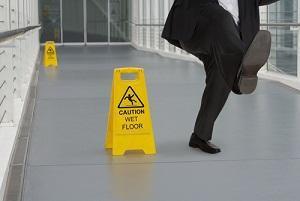 Any type of fall can result in catastrophic back, neck, and spinal injuries. Sadly, many such accidents are caused by the carelessness or inattentiveness on the part the part of the victim. Rather, they occur due to the actions or negligence of the property owners.
Any type of fall can result in catastrophic back, neck, and spinal injuries. Sadly, many such accidents are caused by the carelessness or inattentiveness on the part the part of the victim. Rather, they occur due to the actions or negligence of the property owners.
The Centers for Disease Control and Prevention reports that there were more than 28 million emergency room visits due to unintentional injuries in 2014—the most recent year for which full statistics are available. Many of these were slip and fall accidents which can incur hefty medical bills and thousands of dollars in lost wages for injured victims. It is important to note, however, that if you slipped and fell on someone else’s property, the owner or occupier of the property may be liable for your injuries and the resulting expenses.
Determining Liability
Liability for a slip and fall accident may fall on the owner of the property on which the accident occurred if:
What Does “Reasonable” Mean?
In most slip and fall cases, injured victims accuse property owners of not taking reasonable steps to ensure the premises were safe. The judge and jury will then be required to determine whether a reasonable person would have acted in the same manner as the property owner. There are many factors that may contribute to the court’s determination of what “reasonable” means in a given case, including:
If the property owner is found to have been negligent, he or she may be responsible for your medical bills, lost wages, disability, and even your pain and suffering. To learn more about your options for collecting compensation after a slip and fall accident, contact an experienced Hartford personal injury attorney. Call 860-290-8690 for a free consultation at Woolf & Ross Law Firm, LLC today.
Sources:
https://www.cdc.gov/nchs/fastats/accidental-injury.htm
https://nationalparalegal.edu/public_documents/courseware_asp_files/torts/negligence1/dutyOfCare1.asp
 50 Founders Plaza
50 Founders Plaza

